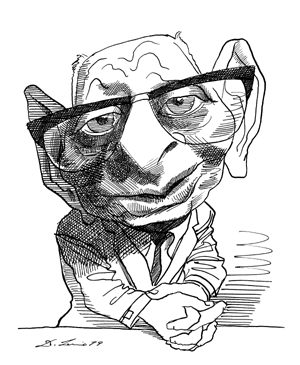It is a formidable task, being a survivor. The new lease of life is not given on the same terms as the old one. Bruno Bettelheim quotes a letter written to him by a half-Jewish woman who survived the Nazi occupation of Holland hidden in a Gentile family: “Again and again I have asked myself, ‘Why was I saved?’ ” A friend who had been a Resistance worker told her, “So that you prove for the rest of your life that it was worth being saved”; quite a burden to carry. And the survivor, the memento mori, can be an inconvenience: when Bettelheim came to the US in 1939 and tried to communicate his experiences inside the Nazi camps he was treated as unbalanced and paranoid, and his paper on the subject—later incorporated into The Informed Heart—turned down by one journal after another.
I wish in this book he had written more, and more directly, about the business of survivorship. He makes it clear that his whole life since his return from the inferno has been in one way or another concerned with integrating his experiences there into his life, making sense of them and using them for good, and that this is what links these collected essays; but in some places the connection is tenuous. Surviving is a selection of papers from his whole professional output, linked by this need to come to terms with Dachau and Buchenwald, and taking the place of the autobiography he was too reticent to write. The papers vary a good deal in interest and substantiality, and some of the slighter pieces, such as those on student revolt and on modern sexual mores, lapse at times into a series of dignified and worthy clichés. As a writer Bettelheim has always been pedestrian: he needs a theme on which he can spread himself, slowly and methodically deploying his special insights within a social or clinical setting.
Without doubt the most moving and important papers in this collection are those to do with the concentration camps and their aftermath; here Bettelheim speaks with absolute authority. The two most important ones are also the best known: “Individual and Mass Behavior in Extreme Situations,” his first, horrific, and disbelieved paper which finally got into print in 1943, and the long piece published in The New Yorker in 1976 on a film of Lina Wertmüller’s that is set partly in a concentration camp. Between them they represent Bettelheim’s two great strengths: his totally realistic acceptance of the satanic in human beings and of the gross disintegrations of personality this can impose on others, and his simultaneous unshaken confidence in order and mutuality and reconstruction. He quotes, in a discussion of the value of art training in education, a jotting of Rilke’s:
Art cannot be helpful through our…concerning ourselves with the distresses of others, but in so far as we bear our own distresses more passionately, give, now and then, a perhaps clearer meaning to endurance, and develop for ourselves the means of expressing the suffering within us and its conquest more precisely and clearly than is possible to those who have to apply their powers to something else.
Bettelheim’s achievement is that while his professional life has been concerned with the distresses of others, he has also been able to teach us through the writings—objective rather than passionate—that are based on his own distresses and endurance. Those experiences are the basis of his special understanding both of the growth and the destruction of what makes a person human.
“Individual and Mass Behavior in Extreme Situations” is essentially about what everyone most fears, the disintegration of the self, either through annihilation by death or, worse, while the body is still alive; but it is also about its preservation. The essay is not written as a catalogue of horrors—they emerge in all their unthinkableness only as illustrations to the argument—but as an analysis of what causes the individual to succumb to, or survive, extreme shock and suffering. One may survive as more or less the same person as before, or so changed that death seems more logical, perhaps preferable; the camps’ “old prisoners,” betrayed by their terrible adaptability into being unable to imagine or wish for the outside world, survived only in this latter sense. Bettelheim ascribes the survival of his true self to two things: a carefully fostered scientific curiosity about what was happening to him and his fellow prisoners—and the fluke that gave him a few days’ isolation on arrival to recover from injuries and shock he received in transit. And he makes it clear that he has not finished working at being a survivor.
The overriding theme throughout these essays is the danger, and the fatal ease, of denying the human capacity for destructiveness into which the author was initiated by his concentration camp experience. In an important essay, “The Holocaust—One Generation Later,” he abandons the careful objectivity of his original account of the camps and speaks their true name:
Advertisement
The ultimate abyss with its unimaginable murderous terror—this is what we should name that which we have come to call the holocaust, if we wish to speak correctly of this unfathomable event. The abyss of the death camps is the destructive potentialities in man enacted.
The piece is a restrained accusation of the countries which denied the real nature of the regime and refused to barter with the Nazis while they were still anxious to deport their Jews rather than murder them. Finding themselves abandoned by the rest of the world, he writes, the Jews’ own destructiveness was turned in on themselves in passive suicidal resignation. More generally, it is an indictment of everyone, Jew or Gentile, past or present, who turns his face away from the truth about man’s destructive potentiality; it was written for a conference on the holocaust at which, Bettelheim says, he was shocked by the defenses the participants put up to protect themselves from the real meaning of what they were discussing. The same defense mechanisms are at work, he argues, in the exploitation of the subject by the media, by books, commentaries, or films that use the death camps as a cliché, or destroy its moral implications as in Wertmüller’s film, or equate genocide with local atrocities such as My Lai.
He is emphatic that this inability to face the truth was equally and dangerously present among the Jewish victims themselves and was one of the chief reasons why so many died who might have escaped, in spite of the doors closed against them in other countries. In “The Ignored Lesson of Anne Frank” Bettelheim argues that the tremendous popular appeal of the Anne Frank story is in its picture of normal family life continuing despite the horrors threatening it, and particularly in the fabricated ending when Anne affirms her undiminished faith in people’s goodness. In fact, he points out, the Frank family’s attempt at survival was an unrealistic one: their hiding place was a trap with no exit, and hiding out together instead of separately gravely reduced their chances of escaping detection. The principle of inertia, the wish not to face the full facts, was at work equally in their decision and in the popularity of the story.
Other essays emphasize how the wish not to know is always the cornerstone of totalitarian systems. In a review of Hannah Arendt’s book on the Eichmann trial Bettelheim characterizes Eichmann as the principle of obedient inertia personified. He picks out a word much used by Eichmann in his defense—Kadavergehorsam, corpselike obedience, adopted from the ethic of the old Prussian army—and compares it with the deathly obedience of the concentration camp prisoner walking to his death; the common denominator is the abdication of awareness of the real facts. In “Remarks on the Psychological Appeal of Totalitarianism” he emphasizes the totalitarian state’s automatic reinforcement of the individual’s defenses against the truth, unless the crucial moment when it is still accessible is seized. He quotes the dream of a German factory owner at a point of decision during the early days of the regime. He was standing in front of all his employees knowing he had to raise his arm in the Fascist salute. It took him half an hour to do it, inch by inch, and doing it in some way broke his backbone; but he had to stand there unmoving, saluting in front of his workers until he woke. His dream represented his final surrender of autonomy to the power of the state.
The other articles in the book range over urban planning, “growing up female,” various aspects of education. The pieces on education, though less weighty than those on the holocaust, are important because, on a subject so peculiarly dogged by good intentions and wishful thinking, Bettelheim brings to bear his usual uncompromising acceptance of unpalatable truths. “By asserting that there is, or ought to be, no place for violence in our emotional make-up, we evade the issue of how to educate for the control of our violent tendencies.” Education, he insists, must take into account what we once called original sin—understand the forms it takes, plan how to channel them constructively, keep them controlled when necessary. About the education of the disadvantaged he is unsentimental: working from a middle-class standpoint, assuming the existence of a cultivated middle-class conscience, he sees as self-defeating.
It may seem curious that the founder of a school where children are allowed absolute liberty to eat and defecate in whatever primitive fashion they choose should also be a firm believer in discipline and hard work for the young. But the contradiction is only apparent. The grossly disturbed child at Bettelheim’s Orthogenic School in Chicago is there to construct a coherent self for the first time, and may have slowly to live out a delayed infancy to do this. Where the relatively normal child is concerned, Bettelheim austerely endorses the orthodox Freudian view that socialization is a sacrifice, only accomplished through anxiety. He will no doubt shock many readers who thought they were unshockable by his affirmation that “if, as modern middle-class parents are often advised, affection and approval are guaranteed to the child no matter what, there will be no fear—but neither will there be much morality.”
Advertisement
Bettelheim is in fact a paradox: an old-fashioned, almost a reductionist Freudian, familiar, as even Freud could not be, with the full force of Thanatos, yet implicitly not only deeply moral but optimistic. Though it is second nature to him to talk in terms of the pleasure principle, of good deeds done because they boost the doer’s self-esteem or allay his anxiety, his values are still those of his generation, with its religious background: self-discipline, duty, unselfishness. His experiences have strengthened, not shaken, his assumption that we are responsible for one another. A psychoanalytic fundamentalist, he has to juggle with the dogma that life is what we project into it: we must invest life with meaning, he says—but does not doubt that life, benignly, gives us back interest on our investment. Above all the conventional virtues he places awareness: it was unawareness that allowed both victims and accomplices to be led toward the great crime. He provides the documentation for the Freudian ethic of honesty. And the survival that concerns him is moral, not bodily, durability; many who in this sense survived had to die. We must “dig towards them,” he says, borrowing Paul Celan’s words. “While it will not awaken them, it may well awaken us to a more meaningful life.”
This Issue
April 19, 1979



